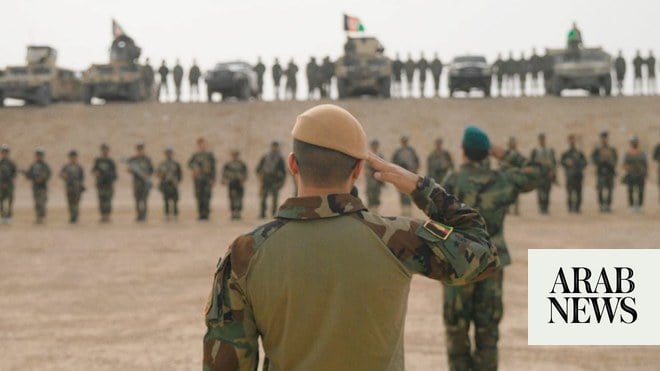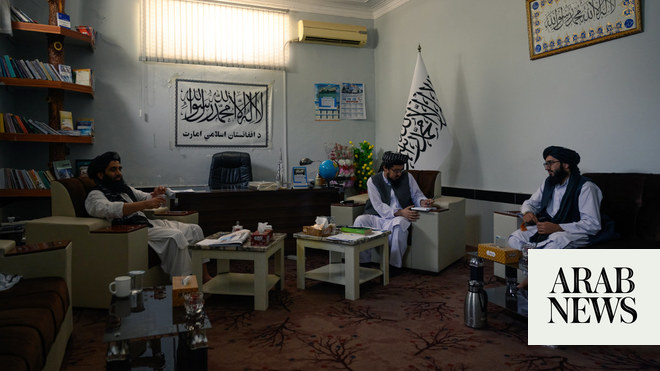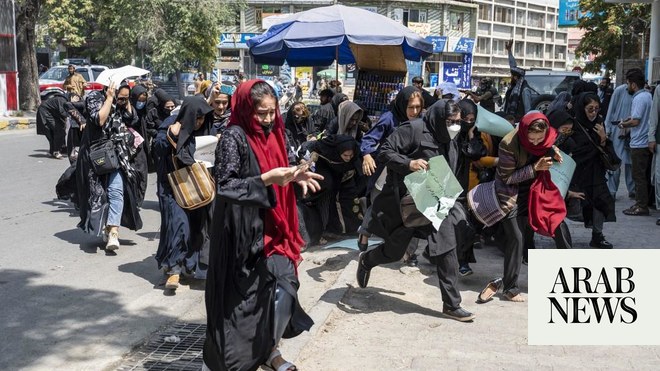
US special envoy Zalmay Khalilzad has embarked on a multi-nation trip that will include talks with the Taliban
The talks in Moscow and Doha are taking place against a backdrop of lingering political uncertainty in Afghanistan
DUBAI: Momentum is once again building for a deal to end America’s longest war, as the US special envoy for Afghanistan prepares for a fresh round of negotiations with the Taliban.
Zalmay Khalilzad is currently on a multination tour that will take him to Afghanistan, Belgium, Germany, Pakistan, Qatar — where he will meet with Taliban officials — and the UAE by mid-June.
Jason Campbell, a RAND Corp. policy researcher, told Arab News: “There’s definitely increased activity surrounding peace, but whether this adds up to a feasible path forward for all stakeholders remains to be seen.”
Trump administration officials say the negotiations between Khalilzad’s team and the Taliban have resulted in a preliminary draft agreement.
The US wants the Taliban to renounce terrorism; break ties with Al-Qaeda and other terrorist groups; respect the Afghan constitution, especially the rights of women and minorities; and be willing to hold bilateral talks with the Afghan government.
The Taliban wants the withdrawal of all foreign forces from Afghanistan, its removal from US and UN blacklists, and the freedom to open a formal political office from which it can operate relatively independently.
The two sides are said to have made progress on the issue of a US troop withdrawal in exchange for guarantees that no transnational terrorist groups will be able to use Afghan soil to attack other countries. But they have been unable to agree on a common vision for Afghanistan’s political future.
All these developments are happening amid lingering political uncertainty in Afghanistan. Parliamentary elections conducted by the Independent Election Commission (IEC) in October last year were marred by fraud allegations and a surge in Taliban attacks.
President Ashraf Ghani, whose mandated term expired in May, is seeking re-election. But the presidential election, scheduled for Sept. 28, has already been postponed twice amid widespread skepticism about the IEC’s ability to organize a fair ballot.
“The appointment of Khalilzad as the special representative for Afghanistan reconciliation has elevated the profile of the topic, with more engagements occurring with public knowledge and media coverage,” Campbell said.
But a secondary effect of this has been the increased involvement of Russia and Afghan actors not connected with the government, he added.
At this stage, Campbell said, it is difficult to distinguish the importance of one round of talks from another.
“Without a single, legitimate negotiating partner in the form of the Afghan government, the Taliban has the opportunity to divide and conquer constituencies,” he added.
“The leaders of these constituencies tend to be concerned more with their own wellbeing and their patronage networks than with the interest of the state.”
Campbell said talks in the past failed to progress for various reasons. “One of the factors was usually that one or more sides weren’t ready to make the compromises necessary to foster a more stable political order,” he added.
It remains to be seen if this is the case now, said Campbell. “The Taliban, while offering pragmatic rhetoric about power-sharing, has yet to offer any details about how it would participate in an inclusive political environment,” he added.
The diplomatic process appears to have gained slight traction with recent talks in Russia and Pakistan.
Ghani met with Pakistani Prime Minister Imran Khan, in what analysts described as a move to ease growing tensions between the two neighbors.
“The US needs to leave Afghanistan. There’s nothing left to achieve, and there hasn’t been for a while,” said Jim Hanson, president of the Security Studies Group think tank.
“We shouldn’t simply continue to fight the same war year after year because no one wants to walk away without a win.”
He said the ongoing negotiations offer an opportunity for a deal to be struck, even though any agreement must be treated with skepticism.
“We’ll make the best deal possible with the Taliban, but no one should pretend we can trust them. We can’t, and they’ll violate any agreement they make with us,” he added.
“We should try to (reach a deal with whoever we can) at this point, and tell the rest that (next time) we won’t be back with boots on the ground, but hellfire from the sky if they let terrorists operate there.”
But Jarrett Blanc, a senior fellow in the Geoeconomics and Strategy Program at the Carnegie Endowment for International Peace, told Arab News that a “survivable intra-Afghan agreement isn’t about trusting the Taliban.”
He said: “Like our partners, they’re not 10 feet tall. Reaching an intra-Afghan deal is instead about crafting an agreed balance of power that reflects the real division of power in the country.”
He added: “Defecting from the agreement in the future would impose dramatic costs and risks on any actor, the Taliban or otherwise.” While a “peace framework” that states the core goals of each side has been agreed upon in principle, fleshing out an agreement in detail will be difficult, Blanc said.
“The timeline for a US withdrawal prompts as much disagreement within the two negotiating sides as between them,” he added.
“Most US military and diplomatic leaders would like a slow drawdown, but (President Donald) Trump wants the war finished, and fast,” Blanc said.“Perhaps surprisingly, the same debate exists within the Taliban. Some Taliban leaders are looking to declare victory and want the US to withdraw quickly. Others, fearing that a precipitous withdrawal would further destabilize Afghan politics and risk their interests, wouldn’t mind a small, low-profile US military mission to last a little longer.”
Campbell said if the ongoing negotiations can bring about an end to the war, the benefits would be far-reaching.
“The attainment of a stable political order in Afghanistan would be a tremendous benefit to the region and the world,” he added.
“The issue remains whether the outside stakeholders — Pakistan, Russia, Iran, the Gulf states, and to a lesser extent China — will resist from using their proxies to artificially hedge things in their favor,” he said. “Afghan society remains fractious, and if one or more of these outside actors believes that talks are going in a direction away from their interests, they have the ability to act as a spoiler.”
The eyes of the world will be on Khalilzad’s meeting with the Taliban in Doha.












